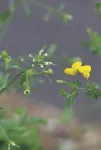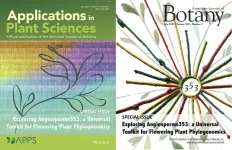Plant root-associated bacteria preferentially colonize their native host-plant roots
2021-07-26
(Press-News.org) Plants, including crops such as rice and wheat, obtain their essential mineral nutrients and water through their roots, making them an important interface between plants and the soil environment. The roots of land plants associate with a wide range of microbes - including bacteria - that are recruited from the surrounding soil and assemble into structured communities known as the root microbiota. These microbial communities are sustained by the plant host, which provides them with nutrients, primarily in the form of organic carbon compounds secreted by the root. In turn, these commensal bacteria mediate multiple processes that are beneficial to their plant host, such as providing defense against pathogens, improving nutrient mobilization from the soil and positively impacting growth. Given their importance for plant health, the study of the root microbiota has evolved into a promising research field that aims to understand how these interactions occur, and could eventually help increase the yield and resilience of crop plants. Although it is well known that plants secrete diverse small molecules into the soil via their roots that serve as chemoattractants for root colonization by a subset of soil-dwelling bacteria, the degree of active selection performed by the host and the extent to which root-associated microbial communities are adapted to specific plant species remain largely unknown. In a new study published in Nature Microbiology, a team of researchers from the Department of Plant-Microbe Interactions at the MPIPZ in Cologne, Germany, and Århus University in Denmark, aimed to gain a deeper understanding of these complex multi-species interactions.
As a first step in this quest, they established a comprehensive collection of root-derived bacteria from the model legume Lotus japonicus, a small proportion of which are symbiotic bacteria that fix atmospheric nitrogen for plant growth. Together with an already established culture collection from roots of the model crucifer Arabidopsis thaliana, synthetic microbial communities (SynComs) were designed to explore the microbiota assembly of different plant species. Although the bacterial communities of the two plants were similar, the researchers observed a clear preference by these bacteria to colonize their native host. This preference was mediated by a higher competitiveness displayed by multiple bacterial species when colonizing their host of origin compared to those originally isolated from the other host.
Strikingly, host preference was only observed in a community context, where different microbes compete among each other, but not when individual bacterial species were allowed to colonize the plant roots in the absence of competition. Analysis of gene expression of both plant species when interacting with different synthetic communities further showed that this process was at least in part driven by the host. Intriguingly, root colonization by native and non-native SynComs exhibited contrasting gene expression profiles for a number of well-known regulators of plant immunity. Based on this observation, the authors then hypothesized that native strains have a competitive advantage when colonizing the roots of their corresponding host plant via the formation of species-specific host niches. To test this hypothesis, the scientists performed a series of complex experiments, where SynComs from different host species were allowed to invade already established root-associated bacterial communities in host and non-host plants. Their results showed that native SynComs had a competitive advantage when invading an already established microbiota in their host plant, indicating that adaptation of commensal bacteria to their native plant species leads to increased invasiveness and persistence.
To quote Kathrin Wippel, first author of the study: "We were amazed to learn that root colonization by native and non-native SynComs resulted in differential transcriptional reprogramming of plant roots, possibly contributing to the formation of specific root niches for native commensal bacteria. These findings indicate that diverse soil-dwelling bacteria associate with and prefer a specific host plant, similar to pathogens or beneficial symbionts of plants." These findings could have a meaningful impact on agriculture, as they highlight the importance of competitiveness between different bacteria and the impact of host preference for successful root colonization. Probiotic inoculants tailored to specific crop plants with an enhanced capacity to invade and persist in standing microbial communities could help overcome the variation in efficacy of currently used biologicals in agriculture.
INFORMATION:
[Attachments] See images for this press release:

ELSE PRESS RELEASES FROM THIS DATE:
2021-07-26
New York, NY (July 26, 2021) - Researchers have identified a rare class of genetic differences transmitted from parents without autism to their affected children with autism and determined that they are most prominent in "multiplex" families with more than one family member on the spectrum. These findings are reported in Recent ultra-rare inherited variants implicate new autism candidate risk genes, END ...
2021-07-26
Bethesda, MD (July 26, 2021) -- There is an urgent need to develop and implement effective screening, diagnosis and treatment strategies for patients with nonalcoholic fatty liver disease (NAFLD) and nonalcoholic steatohepatitis (NASH), common liver conditions with a rising burden in the U.S. and globally. This is particularly important for the most at-risk patients, those with diabetes and obesity.
As a critical first step, the American Gastroenterological Association (AGA) -- in collaboration with seven professional associations -- convened an international conference of 32 experts to develop a multidisciplinary action plan to improve care for the growing population of patients with NAFLD ...
2021-07-26
How do you study a group of organisms with over 300,000 species, dispersed across all seven continents, and with up to 50 times as much DNA content as the human genome?
This is the question posed to biologists studying the evolutionary history of flowering plants, called angiosperms, whose rapid diversification was so convoluted a problem that Darwin referred to it as the 'abominable mystery.'
This month, both the American Journal of Botany (AJB) and Applications in Plant Sciences (APPS) are devoting their July issues to what has recently become a turning point in the way scientists study the relationships among flowering plants. Dubbed Angiosperms353, the initiative combines ...
2021-07-26
DENVER, JULY 26, 2021 -- Improving air quality may improve cognitive function and reduce dementia risk, according to several studies reported today at the END ...
2021-07-26
The Covid-19 pandemic and the politicization of health-prevention measures such as vaccination and mask-wearing have highlighted the need for people to accept and trust science.
But trusting science isn't enough.
A new study finds that people who trust science are more likely to believe and disseminate false claims containing scientific references than people who do not trust science. Reminding people of the value of critical evaluation reduces belief in false claims, but reminding them of the value of trusting science does not.
"We conclude that ...
2021-07-26
DALLAS, July 26, 2021 -- People who are just beginning treatment for high blood pressure can benefit equally from two different classes of medicine - angiotensin-converting enzyme (ACE) inhibitors and angiotensin receptor blockers (ARBs) - yet ARBs may be less likely to cause medication side effects, according to an analysis of real-world data published today in Hypertension, an American Heart Association journal.
While the class of blood pressure-lowering medicines called angiotensin-converting enzyme (ACE) inhibitors may be prescribed more commonly, angiotensin receptor blockers (ARBs) work just as well and may cause fewer side effects. Currently, ACE inhibitors are prescribed more commonly than ARBs as a first-time blood pressure ...
2021-07-26
DALLAS, July 26, 2021 -- Genomic studies have produced advances in how to calculate and reduce heart-disease risk, however, the benefits don't necessarily apply to people from historically marginalized racial and ethnic groups and Indigenous populations. Efforts must be made to eliminate barriers to increase their participation in genomic research, according to a new scientific statement from the American Heart Association, published today in the Association's journal Circulation: Genomic and Precision Medicine.
"Profound breakthroughs in genetic and genomic science are rapidly improving our ability to prevent, detect and treat cardiovascular ...
2021-07-26
NEW YORK, NY (July 26, 2021)--Two types of drugs that are recommended as a first treatment for patients with high blood pressure were found equally effective in improving cardiovascular outcomes, but the more popular type causes slightly more side effects, finds a multinational observational study led by researchers at Columbia University Vagelos College of Physicians and Surgeons.
The study, which analyzed claims and electronic health data from millions of patients worldwide, is the largest to compare the safety and efficacy of angiotensin-converting ...
2021-07-26
Citrus fruits from the mandarin family have important commercial value but how their diversity arose has been something of a mystery
Researchers analyzed the genomes of the East Asian varieties and found a second center of diversity in the Ryukyu Islands along with the previously known center in the mountains of southern China
They discovered a new citrus species native to Okinawa that arose about two million years ago when the Ryukyu archipelago became disconnected from mainland Asia
Other citrus from Okinawa and mainland Japan, including shiikuwasha and tachibana, are hybrids of this newly discovered wild species with different mainland Asian varieties
This research may have commercial implications and ...
2021-07-26
Canada should anticipate a resurgence of a childhood respiratory virus as COVID-19 physical distancing measures are relaxed, authors warn in CMAJ (Canadian Medical Association Journal).
Cases of respiratory syncytial virus (RSV) have risen sharply in Australia and, more recently, the United States as COVID-19 case counts have waned and pandemic public health measures have been relaxed. Respiratory syncytial virus affects the lower respiratory tract and can cause serious illness and death. Before the COVID-19 pandemic, about 2.7 million children worldwide were infected with RSV each year, and it was the fourth most common cause of death in young children.
"The off-season resurgence in seasonal respiratory viruses now potentially poses a threat to vulnerable infants," ...
LAST 30 PRESS RELEASES:
[Press-News.org] Plant root-associated bacteria preferentially colonize their native host-plant roots



